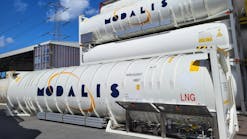The Diesel Technology Forum issued a statement in response to the Center for American Progress Analysis advocating natural gas use in heavy vehicles:
“There is a reason today that diesel powers the overwhelming majority of the nation’s commercial trucking, school, and transit bus fleets. Diesel’s unmatched combination of availability, safety, energy efficiency, and economical operation and performance have made it the technology of choice, but it will be the environmental performance and prospects for even greater energy efficiency that make it the technology of choice for the future,” said Allen Schaeffer, executive director of the non-profit group.
When it comes to conventional emissions of particulate matter and nitrogen oxides, 2010 engines have leveled the playing field with natural gas. Clean diesel is now near zero emissions—and is meeting the same environmental standards as natural gas technology. The new generation of 2010 clean diesel trucks is gaining 4% to 6% improvement in fuel efficiency over previous year’s models.
“This analysis is faulty on many levels, including failing to factor in the anticipated expanded future use of renewable, low-carbon diesel fuel from domestic sources in the nation’s trucking fleet. It also is based almost entirely on the backs and generosity of the American taxpayer to subsidize infrastructure and fuel prices, while delivering questionable benefits and not for 25 years. Clean diesel technology is delivering benefits today in the form of low cost of goods movement and transportation, with an ever-smaller climate and environmental footprint,” said Schaeffer.
Most notably, the report’s assumptions in climate benefits are based largely on the unlocking of new domestic sources of shale-gas through a process known as hydraulic fracturing. A new study by Cornell University Professor Robert Howarth recently studied the greenhouse gas implications of the new process of unlocking shale gas hydro-fracking and found that once the impacts of methane leakage are included, the lifecycle greenhouse gas footprint of shale-gas would be 60% worse than coal fired power GHG or diesel combustion.
According to the Cornell study, “… a complete consideration of all emissions from using natural gas seems likely to make natural gas far less attractive than other fossil fuels in terms of the consequences for global warming.”








